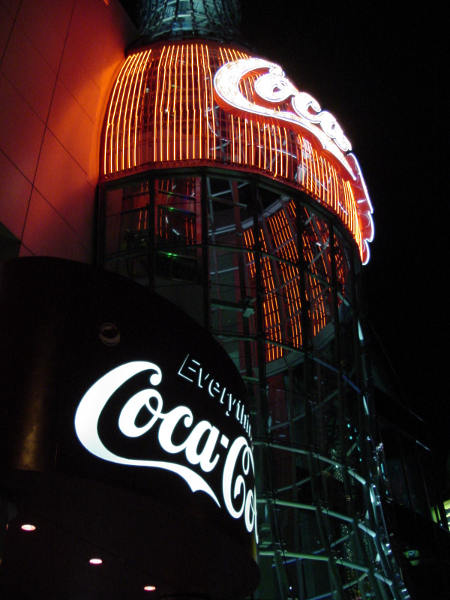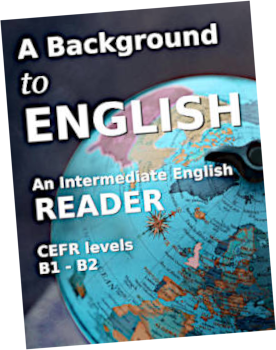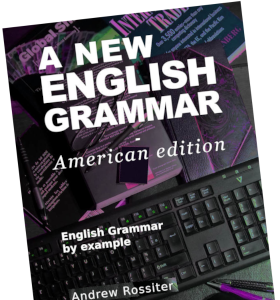Linguapress intermediate English resources
The story of Coca-Cola
NEW AUDIO. ►: Click to open/close audio playerProbably the best-known drink in the world
What is the most recognizable object in the world? Could it be a football? Or a Big-Mac? No, the answer is a Coca-Cola bottle. The famous Coca-Cola bottle is over 100 years old ! Coca-cola
advertisement in Las Vegas
Coca-cola
advertisement in Las VegasIt is said that the Coca-Cola bottle is the most recognised object in the world. Hundreds of millions of people can recognise a Coke bottle by its shape, even if they cannot see it! And the famous Coca-Cola logo is the most famous logo in the world. Unlike any other famous commercial logo, it has not changed in 100 years!
But the story of Coca-Cola is older than that. It was in 1886 John Pemberton, a druggist in Atlanta, Georgia, invented a new type of syrup, coca leaves, sugar and cola nuts, plus a few secret ingredients! Pemberton sold it a medicine; and with its coca (the source of cocaine), it must have people feel good!
Nevertheless, Pemberton's medicine was not very successful, so he sold his secret formula to druggist, Asa Candler. Candler was interested, because he had another idea; he thought that Pemberton's "medicine" would better if it was mixed with soda.
Candler was thus the man who invented the drink Coca-Cola. At first he sold it in his drugstore; then he began the syrup to other drugstores, who used it with their soda fountains. Candler also advertised his new drink, and soon people were going to drugstores just a drink of Coca-cola.
Before long, other people became interested in the product, a couple of businessmen who wanted to sell it in bottles. Candler sold them a licence to bottle the drink, and very the men became millionnaires. The famous bottle, with its very distinctive shape, was designed in 1916.
the First World War, American soldiers in Europe began asking for Coca-Cola, so the Coca-cola company began exporting to Europe. It was so popular with soldiers, that they then had to start bottling the drink in Europe.
Today, Coca-Cola is made in countries all over the world, including Russia and China; it is the world's popular drink.
As for the famous formula, it is probably the world's most valuable secret! The exact ingredients for making Coca-Cola are only to a handful of people. And as for the "coca" that was in the original drink, that was eliminated in 1903. It was a drug, and too dangerous. Today's Coca-Cola contains caffeine, but not cocaine!
And PS.... Health warning! Like all sodas (fizzy drinks) normal Colas contain a lot of sugar. "Far too much sugar", say many doctors.

shape : form - logo: logotype, name-image - unlike : differently to - druggist: pharmacist - syrup: concentrated sweet drink - nuts: hard round fruits - ingredient: element - source: origin - formula: recipe, instructions for making something - soda: bubbling water, fizzy water - advertise: publicise - licence: permit, authorisation - distinctive: memorable, special - as for: concerning - a handful of: a very small number of - eliminate: take out -
Return to Linguapress site index
Printing: Optimized for printing
For obvious reasons, the dropdown options will not show when the page is printed
Copyright © Linguapress. Do not copy this document to any other website
Copying permitted for personal study, or by teachers for use with their students
For students: blank-fill exercise :
Interactive - use on screen or on paper:Using information from the article, complete this résumé in your own words..
Coca
Cola was by John Pemberton, a living
in
Atlanta. The original drink was a , and Pemberton sold
it
medicine. It
was really a , being made from coca
Pemberton his
to Asa Candler, decided to sell it
drink, soda. At
first he it in his
drugstores, then he the to drugstores. After that, he a to some businessmen, and they began to the drink. That was the of the of Coca Cola.
drugstores, then he the to drugstores. After that, he a to some businessmen, and they began to the drink. That was the of the of Coca Cola.
Grammar: articles
Interactive exercise - use on screen or on paper:Most of the articles (a, an, the) have been removed from this extract from the text ; put back the missing articles into the text, but only when they are needed. Take care; in some cases, no article is needed. In these cases select Ø .
What is
most recognizable object in
world? Could it be a
football? Or a Big-Mac? No, the answer is a Coca-Cola
bottle.
Footballs and big macs are certainly part of life for lots of people; but Coca-Cola is now permanent part of world culture. People know and drink Coca-Cola all over world.
It is said that the Coca-Cola bottle is most recognised object in world. Hundreds of millions of people can recognise Coke bottle by its shape, even if they cannot see it! And famous Coca-Cola logo is most famous logo in world.
Unlike any other famous commercial logo, it has not changed in 100 years!
But story of Coca-Cola is even older than that. It was in 1886 that John Pemberton, druggist in Atlanta, Georgia, invented new type of syrup, using coca leaves, sugar and cola nuts, plus few secret ingredients! Pemberton sold it as medicine; and with its coca ( source of cocaine), it must have made people feel good!
Nevertheless, Pemberton's medicine was not very successful, so he sold his secret formula to another druggist, Asa Candler. Candler was interested, because he had another idea; he thought that Pemberton's "medicine" would be better if it was mixed with soda.
Candler was thus man who first invented drink Coca-Cola.
Footballs and big macs are certainly part of life for lots of people; but Coca-Cola is now permanent part of world culture. People know and drink Coca-Cola all over world.
It is said that the Coca-Cola bottle is most recognised object in world. Hundreds of millions of people can recognise Coke bottle by its shape, even if they cannot see it! And famous Coca-Cola logo is most famous logo in world.
Unlike any other famous commercial logo, it has not changed in 100 years!
But story of Coca-Cola is even older than that. It was in 1886 that John Pemberton, druggist in Atlanta, Georgia, invented new type of syrup, using coca leaves, sugar and cola nuts, plus few secret ingredients! Pemberton sold it as medicine; and with its coca ( source of cocaine), it must have made people feel good!
Nevertheless, Pemberton's medicine was not very successful, so he sold his secret formula to another druggist, Asa Candler. Candler was interested, because he had another idea; he thought that Pemberton's "medicine" would be better if it was mixed with soda.
Candler was thus man who first invented drink Coca-Cola.
Lesson plan - for teachers:
Presenting the text in classInteractive article completion: Students should read this text either collectively as a class, or individually.
In classrooms with a connected whiteboard or projector screen, students can collectively choose each of the missing words as you come to them. Click the down arrow to show up the options suggested as you reach each missing word
If you do not have access to these classroom aids and are using paper copies, or if students are looking at the text on individual screens, then the word filling exercise can be done either collectively or individually.
Only one single word, from among the three proposed, is possible for each of the dropdown boxes. Most of the options are grammatical, some are lexical... or both. This exercise will test and hopefully also develop your students' basic grammar and vocabulary.
Depending on the nature of your class, you may like to ask students to explain the right and wrong answers for some of the boxes. For instance, for the first box why can "more" the not possibly be the right answer?
Grammar MCQ exercise - articles
This article well illustrates the use of definite and indefinite articles, and also cases where no article is required or needed.However it also has a number of cases where the use of either a definite or an indefinite article can be justified. For example the text says
Could it be a football? Or a Big-Mac? No, the answer is a Coca-Cola bottle.....
But it could also have said: Could it be the football? Or the Big-Mac? No, the answer is the Coca-Cola bottle.....
The writer has opted to use an indefinite article here, in the sense that "any" football, or "any" Big-Mac may be recognisable.
If he had chosen to say the football, or the Big-Mac, he would have been referring to the object as a category, which is another interpretation.
In later sentences, the Coca-Cola bottle needs to be referred to as a category; we cannot say a Coca-Cola bottle is over 100 years old, as that is not the meaning.
In cases where either a definite or an indefinite article is possible, the writer's choice has been reproduced and students are not invited to choose. In all multiple choice boxes that are present in this extract, only one answer is possible.
For a full explanation of article usage, with clear examples, see A Descriptive Grammar of English, section 2.5.
Text résumé exercise
This comprehension exercise tets students' understanding of the text, their acquisition of vocabulary, and ability to reuse it.Students must read the original text, find the information needed, and put the appropriate words in the boxes.
Follow up activity. Creative writing / oral expression:
When you have completed the text study stage and the exercises, divide students into pairs, and have each pair script a dialogue between John Pemberton and Asa Candler; or between the two businessmen who want to buy a license to bottle and sell Coca Cola.This teaching resource is © copyright Linguapress - renewed 2024
Revised 2022 . Originally published in Freeway, the Intermediate level English newsmagazine.
Republication on other websites or in print is not authorised




